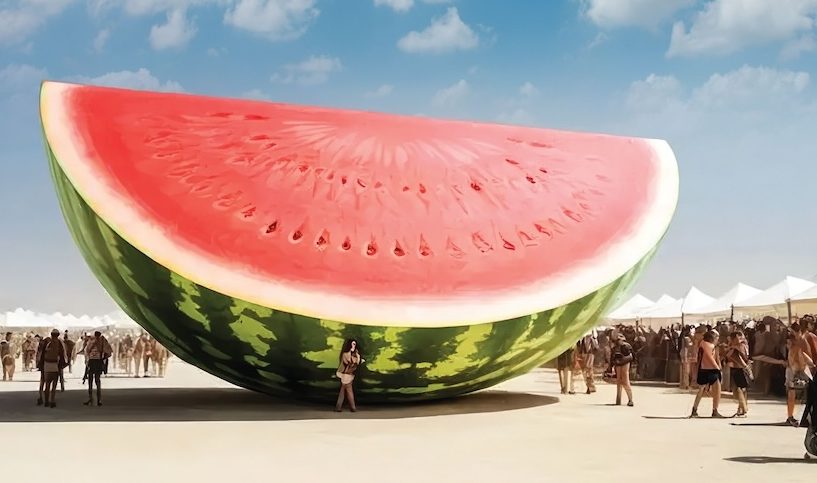In a world where art is often seen as a powerful medium of expression and resistance, the removal of a pro-Palestine artwork from the Burning Man festival’s website has left many feeling voiceless. This decision, prompted by a petition labeling the artwork’s title, “From the River to the Sea,” as antisemitic, reflects a troubling trend where the voices of the oppressed are stifled under the guise of political correctness.
The artwork in question was an 8-by-14-foot fiberglass installation shaped like a watermelon, a poignant symbol of Palestinian resistance. Watermelons have historically been a quiet yet powerful emblem, representing the Palestinian identity and spirit in the face of ongoing occupation and aggression. The title, “From the River to the Sea,” is a slogan widely chanted at international protests against the bombardments of Gaza, a tragic reality that has resulted in over 35,000 deaths.
Burning Man, known for its principles of radical inclusion and self-expression, seemed like the perfect stage for such a significant piece. Yet, the festival’s removal of the artwork, following a Change.org petition, raises critical questions about whose voices are considered acceptable and whose are not. The petition argued that the slogan suggested an intent to annihilate Israel, a claim that overshadows the artwork’s intent to highlight Palestinian suffering and calls for freedom and justice.
The artist behind the installation drew inspiration from Civil Rights activist Fannie Lou Hamer, quoting her powerful words: “Nobody’s free until everybody’s free.” This sentiment echoes deeply within the Palestinian struggle, where the fight for freedom and recognition continues against a backdrop of systemic oppression.
By removing the artwork, Burning Man has silenced a crucial narrative, one that highlights the Palestinian people’s plea for justice. This act of censorship not only denies Palestinian voices and reflects a broader hypocrisy in the modern world. In an era where movements like Black Lives Matter have rightly garnered global support, the Palestinian struggle for freedom remains marginalized, often misrepresented or suppressed.
This incident at Burning Man is more than just an isolated event; it’s a microcosm of a larger issue. It underscores the selective nature of the world’s empathy and the inconsistent application of principles that festivals like Burning Man claim to uphold. When art that seeks to amplify the plight of an oppressed group is deemed too controversial, it begs the question: Are we truly committed to the values of justice and equality for all?
For many Palestinians, this removal is yet another reminder that their voices are often unwelcome in mainstream dialogues about human rights and freedom. It highlights the ongoing struggle to have their stories heard and their pain acknowledged. In silencing this artwork, the message is clear: Palestinian narratives are still fighting for a place in the global conversation. As we reflect on this incident, it’s crucial to recognize the importance of giving space to all voices, especially those that challenge us to confront uncomfortable truths.
Burning Man’s decision to remove the pro-Palestine artwork is a call to action for all of us to ensure that the fight for freedom and justice includes everyone, without exception. To support the voices that are silenced, you can donate to the Kuwait’s Red Crescent Society for Palestinian relief.










